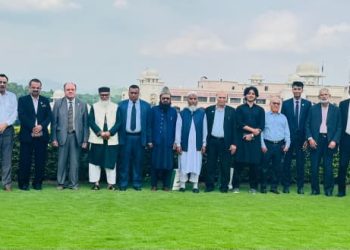WNAM REPORT: In a concerted diplomatic and economic outreach to Japan’s public and private sectors, Pakistan’s Federal Minister for Commerce, Mr. Jam Kamal, has invited Japanese collaboration in Pakistan’s underexplored mineral sector, with a strong emphasis on joint ventures in exploration, processing, and value addition.
During a high-profile series of meetings in Tokyo with the Japan International Cooperation Agency (JICA), the Japan External Trade Organization (JETRO), and the Japan–Pakistan Business Cooperation Committee (JPBCC), the Minister reiterated Pakistan’s commitment to fostering mutually beneficial partnerships anchored in sustainability, innovation, and economic integration.
Unlocking Mineral Potential for Strategic Investment
A central focus across all engagements was the mineral sector’s untapped potential. The Minister positioned Pakistan’s vast reserves of rare earth elements, copper, gold, and other industrial minerals as a strategic domain for Japanese investment. He extended a strong invitation to Japanese companies to participate in exploration, modern processing technologies, and value-chain development, not only for the domestic market but also for export to third-country destinations by leveraging Pakistan’s geostrategic location.
“Our mineral sector remains largely underexplored,” the Minister stated. “We are offering Japanese partners the opportunity to participate in high-value ventures that can help build sustainable supply chains for critical minerals—an area aligned with Japan’s global industrial needs.”
He highlighted that Pakistan is open to technology transfer, public-private partnerships, and investment frameworks that ensure mutual gain and long-term impact.
Strategic Development Cooperation with JICA
In discussions with Mr. HARA Shohei, Senior Vice President of JICA, and officials from the South Asia Department, the Minister underlined the importance of aligning future cooperation with Pakistan’s national priorities—especially industrial modernization, workforce upskilling, and trade facilitation.
JICA’s ongoing contribution—amounting to $11.7 billion over the years—was acknowledged, particularly in areas like transportation, energy, vocational training, and disaster resilience. The Minister urged JICA to consider additional support for industrial clusters and logistics corridors that can facilitate mineral exports and value-added production.
He also called for expanded technical cooperation to build Pakistani capacity in modern industries, including digital innovation and green technologies, while highlighting reform efforts in taxation, energy, agriculture, and human capital development.
Enhancing Investment Synergies with JETRO
In his meeting with JETRO President Mr. Susumu Kataoka and Executive Vice President Mr. Kazuya Nakajo, the Minister emphasized the critical role JETRO plays in promoting trade and investment awareness between the two nations. He encouraged Japanese firms to actively explore investment opportunities in Pakistan’s Special Economic Zones (SEZs) and value-added sectors including ICT, light engineering, and food processing.
Specifically, the Minister called on JETRO to promote Pakistan’s mineral investment potential among Japanese industrial giants through targeted campaigns, seminars, and B2B engagements. He invited Japanese participation in Pakistan’s flagship trade exhibitions organized by the Trade Development Authority of Pakistan (TDAP), offering practical entry points for business collaboration.
“The mineral sector is a goldmine of opportunity for Japan,” the Minister noted. “Through our SEZs, modern infrastructure, and policy incentives, we are ready to support Japanese investors every step of the way.”
Strengthening B2B Bridges via JPBCC
At a luncheon hosted by the Japan–Pakistan Business Cooperation Committee (JPBCC), the Minister praised the Committee’s long-standing role in building robust business-to-business linkages. He called on JPBCC to take an active role in shaping the upcoming Pakistan–Japan Business Dialogue (PJBD), with specific input on mineral cooperation, manufacturing, ICT, engineering, and agri-value chains.
Reaffirming Pakistan’s investor-friendly stance, he assured Japanese businesses that their operational concerns—such as those raised by companies like Ajinomoto—are being resolved through high-level inter-ministerial coordination.
“Our doors are open. We see Japan not only as a partner but as a catalyst for transforming Pakistan’s economic base. With your advanced technology and our resource potential, we can build future-proof industries together,” the Minister concluded.
Outlook: A New Chapter in Pakistan–Japan Economic Cooperation
These engagements mark a strategic shift in Pakistan’s approach to trade and investment diplomacy—prioritizing high-value sectors like minerals and value-added manufacturing while aligning with global sustainability and innovation trends. Japan, with its technological prowess and strategic industrial ambitions, is well-positioned to be a core partner in this transformative journey.
The shared vision expressed across JICA, JETRO, and JPBCC forums reflects growing momentum toward a future-focused, resource-enabled, and inclusive economic partnership between Pakistan and Japan.








